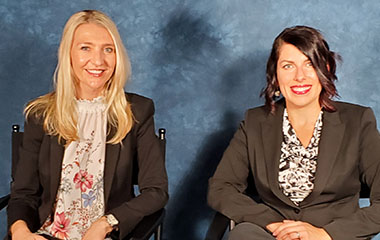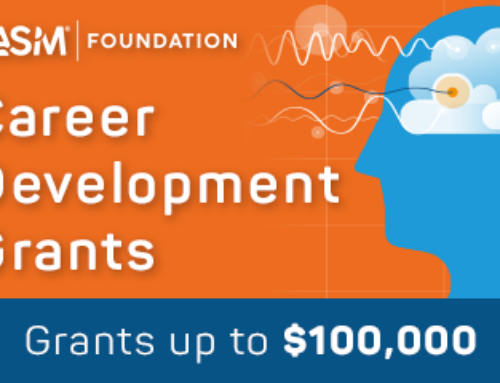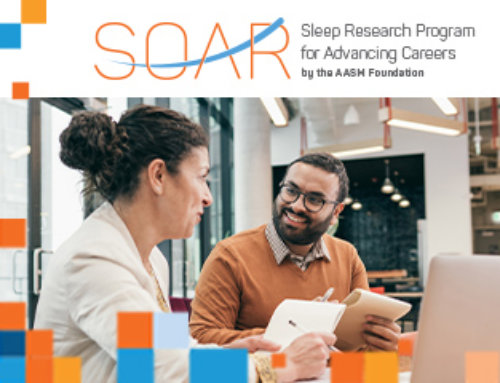Christine Spadola, PhD, and Danielle Groton, PhD, are recipients of the 2018 Focused Projects Award – Educational. Learn more about how their project is improving sleep health knowledge and training among social work students.
Christine Spadola, PhD, and Danielle Groton, PhD, are assistant professors in the Phyllis and Harvey Sandler School of Social Work at Florida Atlantic University. Spadola completed her postdoctoral fellowship under the mentorship of Drs. Susan Redline and Suzie Bertisch while working on a project implementing a sleep hygiene and yoga intervention in low-income housing communities. There she immediately learned that sleep health information dissemination is lacking among underserved communities.
“As a licensed mental health counselor, and an assistant professor of social work, I’m very surprised that sleep education is not a required component of mental health counseling and social work program, considering the strong evidence supporting the bi-directional association between sleep and mental health,” said Spadola. “Taken together, because social workers often work with vulnerable populations, it seems like a good start to try to develop feasible and sustainable educational modules to equip social workers to address sleep health among the populations they serve.”
Groton completed her dissertation on homelessness and worked at an emergency services center for individuals experiencing homelessness. As both an administrator for that facility and as a researcher, she saw firsthand how shelters and housing programs have little guidance in promoting sleep health among individuals residing in a shelter or unsheltered environment, and how in turn this impacts individuals’ physical, mental, and emotional well-being.
“Overnight clients at the center would often report how they had little sleep due to environmental noise, anxiety, or uncomfortable bedding, leaving them feeling unwell and ill-prepared to attend job interviews or navigate social services,” said Groton. “This observation led me to seek out collaboration with Dr. Spadola, because I realized how beneficial dissemination of sleep health knowledge could be for practitioners in my field.”
Given Spadola and Groton’s knowledge of the education available for social workers when approaching sleep issues in vulnerable populations, the goal of their 2018 Focused Projects Award – Educational project, “Empowering Social Work Students to Promote Sleep Health among Underserved Populations,” was to develop an educational module to equip social work students to promote sleep health with their clients.
The Sleep Health Training program in action
They developed a 120-minute online program that contains modules on sleep hygiene, sleep disorders and the importance of referring to a sleep physician, fatigue and fatigue countermeasures, as well as a student testimonial about how behavioral health clinicians can empower clients to see a sleep physician to screen for sleep disorders. The program also contains self-check questions after each module, as well as information on sleep and vulnerable populations including stakeholders of the child welfare system, individuals experiencing homelessness, older adults, and individuals in recovery for substance use disorders.
“Students responded favorably to having multiple guest speakers share their expertise and especially hearing from a fellow student who provided a testimonial on how her life was changed when a behavioral health clinician referred her to a sleep physician,” said Spadola.
“The students also enjoyed the interactive case scenarios on promoting sleep health among vulnerable populations and reported that the practical applications of these real-world simulations to underserved populations felt significant and relevant to their practice,” said Spadola and Groton. “While not the primary focus of the training, students indicated that taking the training led to their reflection and modification of their own sleep hygiene as well.”
Throughout the course of developing and implementing the online program, Spadola and Groton noticed that the first wave of 20 social worker students yielded significant improvements in sleep health knowledge after participating in the online program. “We are eager to complete recruitment and examine changes in knowledge and sleep beliefs among our entire sample of 100 social worker students,” said Spadola.
Given feedback from participants that the training increased their knowledge, as well as impacted their own sleep hygiene, Spadola and Groton hope that their project will empower behavioral health clinicians to address their personal sleep health and promote sleep health among underserved populations through information dissemination, referral, and behavioral sleep health interventions.
“The AASM Foundation award has been very helpful to our careers. We have lots of exciting directions we want to take our research in and continue to work together to promote sleep health among populations that often experience health disparities,” said Spadola and Groton. “Our next step, specifically, is to refine our module and disseminate to broader audiences. In fact, we have already had requests from local community agencies to obtain access to the sleep health training once we have completed the study. We are excited for this opportunity and open to other ideas and collaborations!”
Special Acknowledgements
Drs. Spadola and Groton would like to thank the following researchers in the sleep community who provided guest lectures, expert input, and/or input to the development of their sleep health module: Drs. Suzie Bertisch, Eric Zhou, Cassie Hilditch, Susan Redline, Ben Henwood, Jo Solet, Rowan Ogeil, Kerry Littlewood, Abhi Pandey, and Brian Redline.








